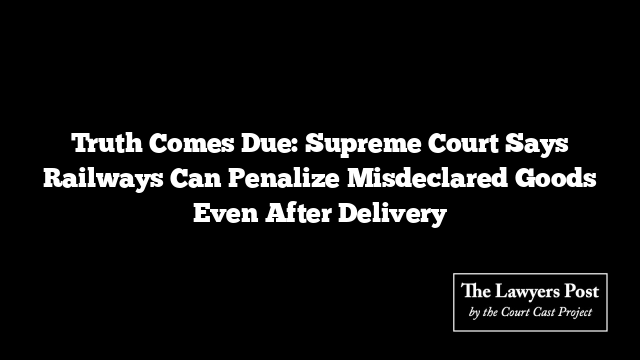In a ruling that gives the Indian Railways long arms and a longer memory, the Supreme Court has declared that penalties for misdeclared goods can be slapped not just at the station—but even after the goods have reached their destination and been offloaded.
At the heart of the legal skirmish was Section 66(4) of the Railways Act, 1989—a seemingly plain provision that now carries heavy implications for transporters tempted to play fast and loose with goods declarations. A Bench comprising Justices Sanjay Karol and Prashant Kumar Mishra held that nothing in the law prevents the Railways from recovering accurate dues—even after a consignment has been delivered.
The verdict dismantles a 2021 Gauhati High Court ruling which had drawn a line in the sand, saying post-delivery penalties were off the table. But the top court found that line imaginary. The Justices noted that the Act doesn’t pin down when the penalty must be imposed, thereby enabling recovery “either before or after” goods are delivered.
The dispute stemmed from demand notices issued in 2011 and 2012 to Kamakhya Transport Pvt. Ltd. and others, accused of underreporting the nature of goods shipped via the national carrier. The companies paid the sums—but under protest—and sought refunds from the Railway Claims Tribunal, citing earlier rulings that supported their stand.
The Tribunal and the High Court leaned on past precedents, including Jagjit Cotton Textile Mills, to back the view that charges should be demanded before goods reach their destination. But the Supreme Court saw a crucial distinction: Sections 73 and 78, which deal with overloading, do require pre-delivery action. Section 66, however, deals with false declarations and carries no such timing constraint.
In other words, while you can’t punish someone for overstuffing a wagon after it’s been emptied, you can charge them for lying about what was inside it—whether or not the contents have reached the consignee.
The Court also brushed aside the argument that the demand notices weren’t legitimate, noting that no solid evidence had been presented to question their authenticity.
In the end, the Supreme Court allowed the Union of India’s appeals, reinstated the Railways’ demand notices, and overturned the decisions of both the Tribunal and the Gauhati High Court.
With this ruling, the message is loud and clear: misdeclare a shipment, and the Railways will find you—on time or after time.





